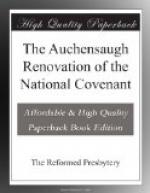Under this head of doctrine, he gave the following marks to evidence whether the present time of renewing our covenant with God was indeed to us a time of the Lord’s privileging us with his gracious presence—1st, That a time of God’s privileging his people with his gracious presence, and with a shower of gospel grace, is a very inviting and alluring time; wherein, as the Lord invites his people to their duty, by engaging their hearts and souls, through his Spirit’s gracious influences, to fall in love with him and his commandments, so they mutually invite one another to covenant with God. 2d, That such a time proves a soul-engaging and taking time, wherein souls are engaged to fall in love with the covenant, and with Christ the Mediator of the covenant, and are taken in the net of the gospel. 3d, That a time of the letting out of God’s gracious presence is ordinarily a time of many sweet and excellent resolutions, the people of God resolving to walk more accurately and circumspectly in the ways of new obedience. 4th, That this usually is a time of ridding marches, and clearing of evidences. 5th, That it is a time of many and special confirmations of God’s love to the soul. 6th, That this time of God’s letting out much of his gracious presence to his people, is a very uniting and healing time to them amongst themselves. Having given these marks, to show whether the Lord were, at the occasion, letting out his gracious presence, he added, by way of caution, that seeing (no doubt) the people of God would be expecting something of all these, upon the undertaking of so great a work; if so be that they found it not, they should not thence be induced to have hard thoughts of the Lord, and to conclude that he keeps not his usual method with his people, or is not so good to them as formerly he hath been: for whatever defects there are upon his people’s part, there is none upon the Lord’s, for he remains the same to them, providing they do so to him; the change of his dispensations towards his people being from the change of his people’s deportment towards him.
The Second Doctrine, resulting more directly from the words, was, That the Lord’s Spirit poured out in plenty upon his people will quickly bring them to an embracing of him, and to a public acknowledgment and avouching of the same. Thus it was with the people of God in the text—no sooner does the Lord “pour water upon the thirsty, and floods upon the dry ground,” even his Spirit upon the spiritual seed of Israel, but presently they are at covenanting work and subscribing work; “One shall say, I am the Lord’s,” etc. In prosecuting this doctrine he shewed first negatively that he was not for that occasion largely to treat of the several ways that the Spirit useth to manage this work of engaging the hearts of his people to embrace Christ, and so to make a public avouchment of the same; whether he doth it by representing to their views the sweet and precious promises made in




